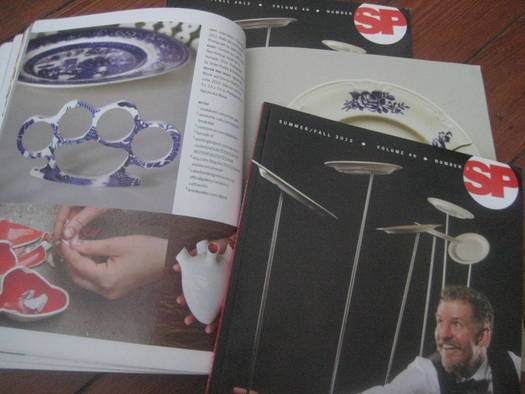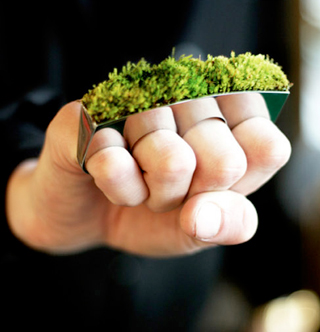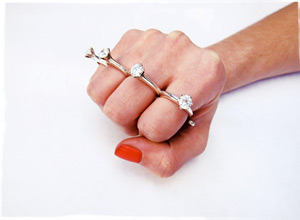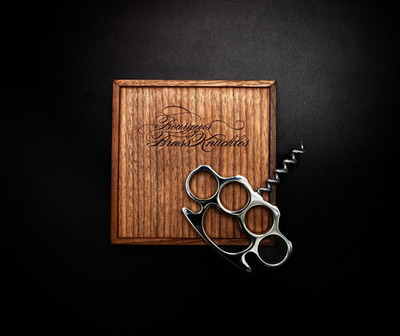The mail recently brought copies of Volume 40 of The Studio Potter: The Independent Journal of Ceramics. That’s not a typical occurrence at the home office, but this issue of the magazine was guest-edited by the delightful and ever-impressive Garth Johnson, who invited me to contribute something. While I’m hardly an expert on this craft, we did find a subject that I’ve wanted to address and that made sense for Garth: breakability.

Studio Potter No. 40, including reference to China Knuckles, by Juliet Ames
You’ll have to pick up the issue (which is quite wonderful and full of interesting essays and imagery) to read that.
But I'll say this. Along with my consideration of various objects that had been essentially designed to be broken, I noted Juliet Ames’ China Knuckles: I love the idea of using water jet-cut recycled porcelain to create a highly fragile-looking rendition of an object known for extremely resilient, functionally violent, strength. Brass knuckles — or knuckledusters if you like — are designed to do damage. This is not a thing you're meant to worry about being damaged. And Ames’ re-imagining of the object could be the jumping-off point for a whole separate piece not about breakability, but about the curiously familiar brass-knuckle form.
That separate piece is of course what you are now reading.
It turns out that I “collect” — in the sense of noting and tagging images found online — brass-knuckle variations. In the era of concealed-handgun laws and Predator drones, brass knuckles are practically weapons-kitsch. And yet this distinctly dated form remains instantly recognizable, and evidently potent, enough to inspire multiple design riffs. Why? Surely the raw brutality of the weapon is one reason. Broadly, a great theme in the devising of violence tools is distance — how far the aggressor can be from the site of the damage inflicted — and on this score brass knuckles have little to offer. To the contrary, they mean to amplify the power of the least-distant weapon imaginable: the fist. Even a knife or a lead pipe or a rock do more to insert themselves between the violent hand and its intended victim.
A piece like China Knuckles works, then, because brass knuckles, although antiquated and vaguely ridiculous, remain menacing. Indeed it’s possible to find contemporary examples of what I guess I’d call hyper-weaponized brass knuckles (combined with knives, or used as the base form of Taser-like “zap knuckles”), and at least one company makes a super-hard plastic variation than can supposedly avoid detection at the airport. But I’m not going to dwell on that.
I’m more interested in work that acknowledges, but on some level subverts, or perverts, brass-knuckle power. A garden-fist piece from the “Growing Jewelry” line from HAF by Hafsteinn Juliusson fits the bill. The line also includes a necklace and a ring, but isn’t it particularly compelling to consider a brass knuckle form reimagined as a container of life?

Another rather nice example: Kate Bauman’s “'Til Death Do Us Part” knuckleduster. “A lot can be said about this ring,” Bauman suggests on her site. Well, yes. Marriage has its struggles, but perhaps the upbeat read here is that the bride might deploy iced-out haymakers on the couple’s behalf — us against the world! — rather than to settle a lovers' quarrel.

'Til Death Do Us Part, by Kate Bauman
Finally I’ll mention instances of domesticating brass knuckles as handy (heh) kitchen tools. A handle-of-a-corkscrew example just came across my radar the other day, and that’s somewhat interesting in its injection of street-thuggery into oenophile ritual.
But I’d personally be more interested in owning knuckledustered meat tenderizer. I have my doubts about its functional prowess compared to the more familiar hammer-style tenderizer, but I can easily imagine the attraction. We all have our moments of craving a primal beat-down of whatever abstract forces frustrate our days. It’s hard to imagine how a little physical catharsis could be channeled into something more pleasing than particularly tender chicken-fried steak.


